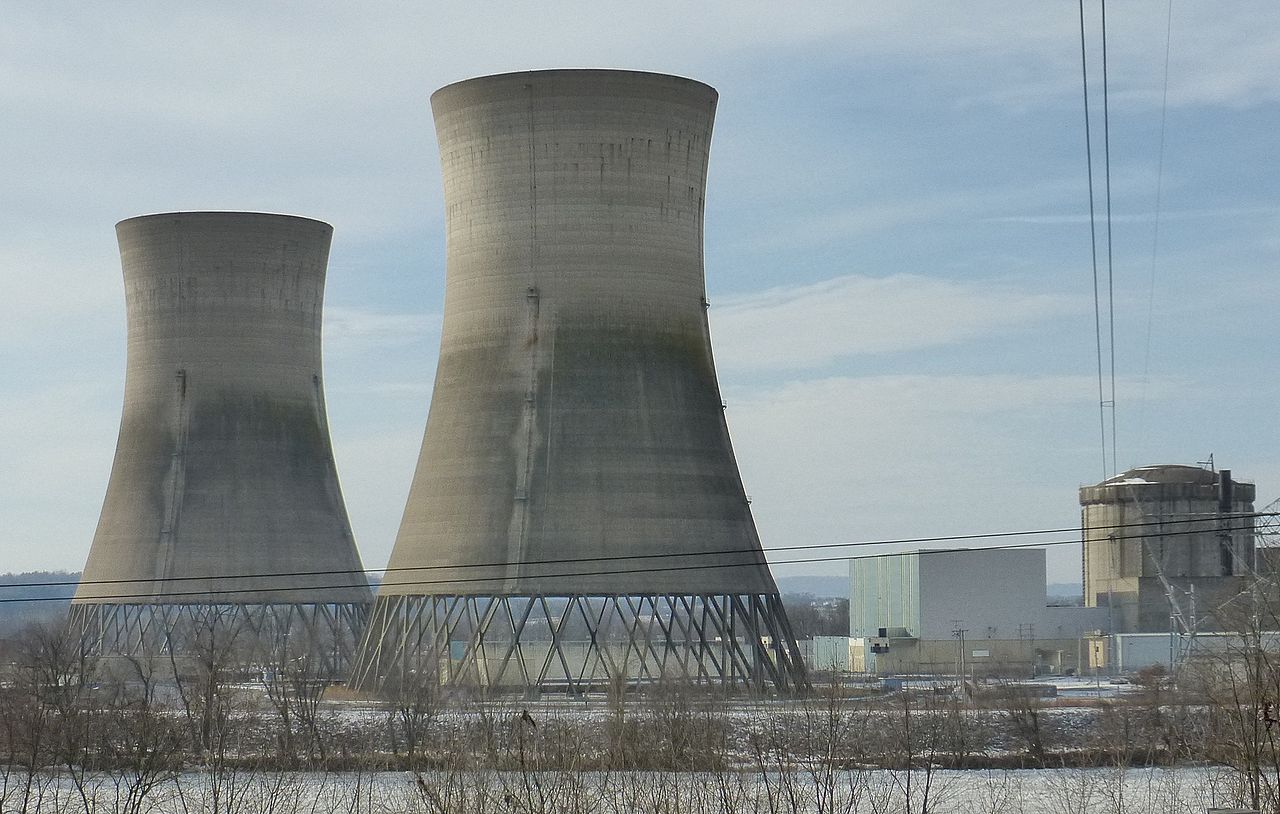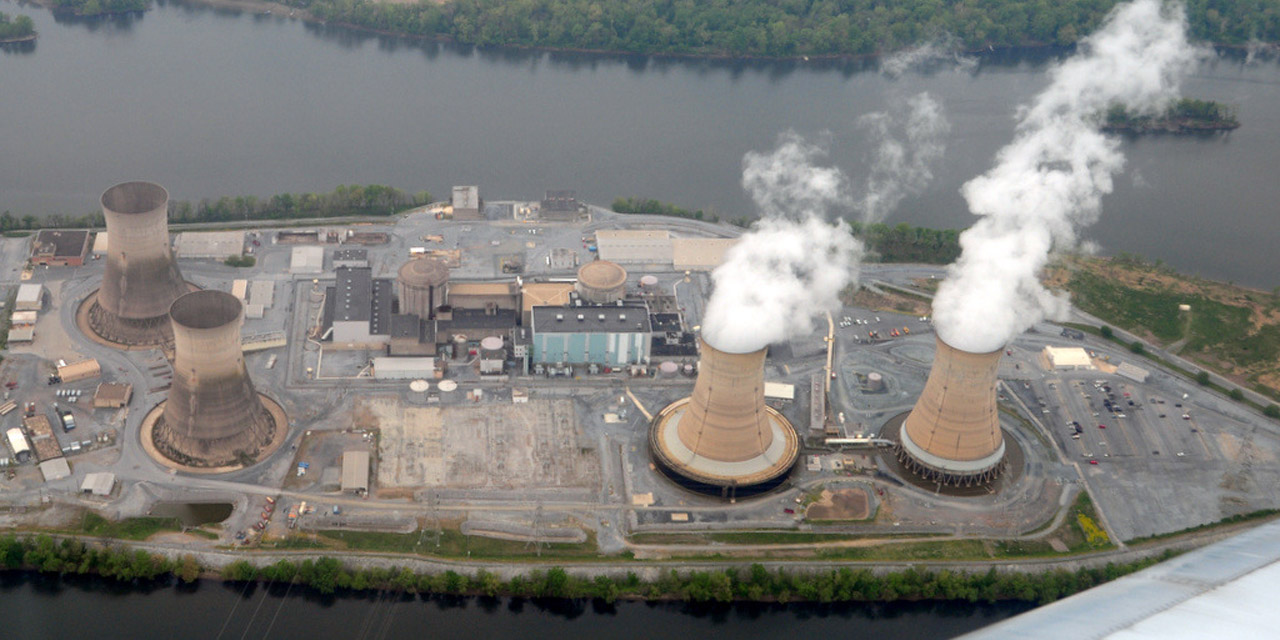The cooling towers of Unit 2 at Three Mile Island Nuclear Generating Station, closed since the accident in 1979.
The Three Mile Island accident in 1979 was the most-studied nuclear reactor event in the U.S. There is a plethora of research about the accident available to the general public, including the president-appointed Kemeny Commission report and the Nuclear Regulatory Commission’s Rogovin inquiry report (split into volume one, and volume two, parts one, two, and three), which are the two detailed government-sponsored investigations into the accident. There are also thousands of documents in the NRC’s ADAMS database available to the public, an excellent overview by NRC historian Samuel Walker Three Mile Island: A Nuclear Crisis in Historical Perspective, as well as the Nuclear News special report from April 1979, and articles written by ANS members like William Burchill about the accident and the many changes it forced on the industry. If the producers of Meltdown: Three Mile Island—available on Netflix—had read any of those documents instead of relying mostly on input from antinuclear activists, their “documentary” might have been presented with at least some sense of balance and credibility.
Instead, similar to a recent Science Channel documentary on the Three Mile Island accident, Meltdown focuses on drama instead of science. This four-part miniseries does not attempt to provide a balanced set of facts from the technical community and instead relies heavily on nonexpert opinions and anecdotal statements to tell a story that easily falls apart under even the faintest scrutiny.
Nuclear News reached out to multiple ANS members who were involved with either the accident response or the clean up to help provide a critical look at some of the more egregious statements made in the documentary.
The accident at Three Mile Island revealed many areas for improvement in the safety of nuclear power that have been addressed continuously in the past 40 years.
Part one of this article, published in the May 2019 issue of Nuclear News[1] and last Friday on Nuclear Newswire, presented insights from the 1979 accident at Three Mile Island-2 and addressed several issues raised by a previous Nuclear News piece on the accident[2]. Part two discusses safety improvements that have been made by both the industry and the Nuclear Regulatory Commission over the past 40 years.
Presidential nominations to the U.S. Nuclear Regulatory Commission (NRC)
Statement from American Nuclear Society President Steven Nesbit and Executive Director and CEO Craig Piercy:
Sparked by an article on the TMI accident that appeared in the March 2019 issue of Nuclear News, ANS past president William E. Burchill (2008–2009) offered his own views on the subject. Part 1 of the article appeared in the May 2019 issue of NN and Part 2 was published in June 2019.
The accident at Unit 2 of the Three Mile Island nuclear power plant on March 28, 1979, was an extremely complex event. It was produced by numerous preexisting plant conditions, many systemic issues in the industry and the Nuclear Regulatory Commission, unanticipated operator actions, previously unrecognized thermal-hydraulic phenomena in the reactor coolant system (RCS), and the unprecedented challenge of managing a severely degraded core.
Pictured from left to right: John Tappert, NRC; Jonathan Rowley, NRC; Jacob Zimmerman, NRC; Matthew Bartlett, NRC; Tim Beville, DOE; Jennifer Wheeler, TRISO-X; John Lubinski, NRC; Pete Pappano, TRISO-X; Jill Caverly, NRC; and Shana Helton, NRC. (Photo: X-energy)
An NRC diagram of a LLW waste disposal site.
The Nuclear Regulatory Commission will integrate two separate rulemaking activities concerning the disposal of low-level radioactive waste, issuing a “re-proposed” rule that consolidates updates to 10 CFR Part 61, “Low-Level Radioactive Waste Disposal,” and proposed changes to the requirements for the near-surface disposal of greater-than-Class C (GTCC) waste.
The NIST Center for Neutron Research in Gaithersburg, Md. (Photo: NIST)
In the 13 months since a fuel element failure triggered a scram of the research reactor at the National Institute of Standards and Technology’s NIST Center for Neutron Research (NCNR), the event and its causes have been scrutinized by both NIST and the Nuclear Regulatory Commission.
Initial conclusions from an NRC special inspection released on March 16 confirm that while public health and safety was maintained during and after the event, and doses to reactor facility staff were well below regulatory limits, a safety limit was violated when the temperature of the fuel cladding of a single fuel element in the 20-MWt research reactor reached a temperature high enough to partially melt the element.









 The Nuclear Regulatory Commission yesterday unveiled its
The Nuclear Regulatory Commission yesterday unveiled its 

